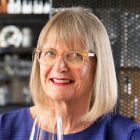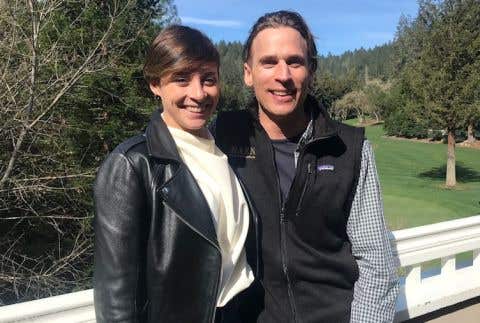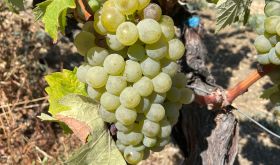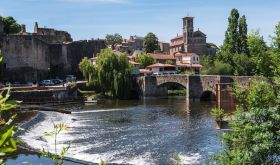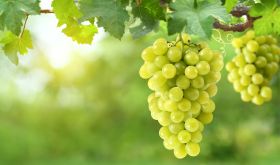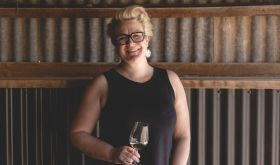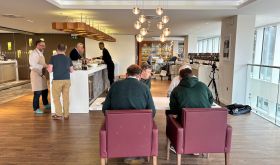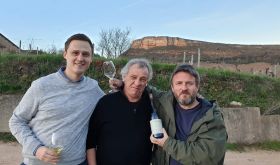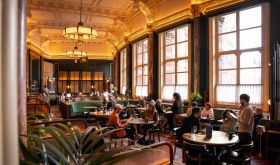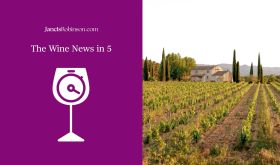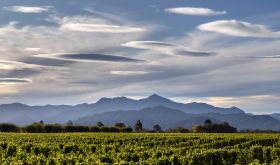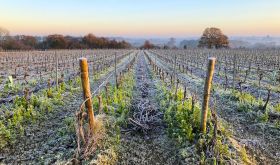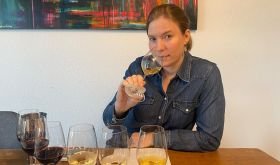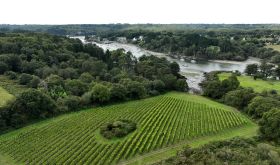There is no shortage of people whose public relations persons think they changed the world of wine forever. There are very few who really did. Robert Mondavi of the Napa Valley in California was one of them. (See my personal recollections of him written in 2003.)
For 40 years he made it his business to draw what were then called the New and Old Worlds of wine together, ceaselessly travelling, tasting and refining his company’s winemaking techniques. Putting California on the world wine map. Wooing Baron Philippe de Rothschild of Bordeaux to make a tiptop Napa Cabernet, Opus One, with him. Daring the world’s most influential commentators to taste Robert Mondavi wines alongside the greatest in the world.
The other thing that defined him was family strife. He founded his eponymous winery in 1966 after quarrelling with his younger brother Peter (who died in 2016 at the age of 101) over policy at the family’s Charles Krug winery. Disagreements between Robert and his children were a factor in the Robert Mondavi Winery falling in 2004 into the hands of Constellation, one of the world’s biggest wine companies with a very different ethos. His sons Michael and Tim went their different ways, though each produces classic California wine in the form of a ripe, dense Napa Valley Cabernet.
Two years ago I suddenly heard from someone called Carlo Mondavi, who wanted me to taste some very different wines, the lean, fresh, Sonoma Coast Pinot Noirs that he and his younger brother Dante are making under the Raen label. Email correspondence suggested Carlo was a bit of a communicative chip off the Robert block even if his concerns are very different from those of his beloved grandfather, who died four years after his company was sold (see various obituaries).
When we finally met properly, over brunch in Napa Valley in February, Carlo said of his grandfather that he mostly remembered how ‘happy and kind and sweet’ he was, adding, ‘I’ve been able to gather so much inspiration from him. His response was never what I expected, and he always had great wisdom to share. He always said the biggest risk is not taking a risk at all.’
Carlo, the middle one of Tim’s five children and the oldest son, has certainly had his time in the risky wilderness, including trying to get a grape-based skincare business off the ground. He has managed to gussy up his bio to feature periods of study but by 23, rather than graduating, he was a professional snowboarder who, when offered a cheque or cash as the prize for winning one European competition, really, really needed the cash.
Young Mondavis may have had summer jobs in vineyards and cellars but the family rule was that you got a full-time Robert Mondavi Winery job only if you had graduated and could prove you were better than any other candidate. When the family company was sold, Tim started his own Continuum wine estate. His daughter Chiara, Carlo’s older sister, is winemaker, and both Dante and Carissa, oldest of them all, work for their father. Carlo admits to having been the black sheep of the family.
It may have taken some time for wine to seep into Carlo’s professional life but he claims now that a low flame was lit back in 2002 when Robert took the whole family on a grand tour of some of Europe’s finest wine producers, to show them what had inspired him 40 years earlier when he decided he wanted to, in his oft-repeated phrase, ‘make wines that belong in the company of the finest in the world’. When the Mondavi clan was touring Burgundy, Carlo happened to be driven by the late biodynamic viticulture pioneer Anne-Claude Leflaive of Domaine Leflaive in Puligny-Montrachet. He claims now that this journey changed his life, even if the fuse was a slow burner.
Today, as a result of absorbing Anne-Claude’s philosophy, in addition to the Sonoma Coast project in which Dante makes the wines and Carlo does the talking*, Carlo is focused on environmental matters. Three years ago he launched the Monarch Challenge, an ambitious attempt to rid Napa and Sonoma of all herbicides, especially Roundup and other glyphosates, so that they become a model of truly ‘clean farming’.
His current pet project is even more ambitious: the development of a smart electric compact tractor. ‘I basically realised that we have to find a way to farm economically and sustainably. The argument against organic farming is economic, so I thought an electric tractor might do the trick. But my problem is that I’m not an engineer, even if I have worked on tractors all my life.’ Maybe his surname helped. Or maybe it is the proximity of Silicon Valley. Whatever the reason, Carlo has managed to interest software designers involved with Lift, Tesla and an agrorobotics specialist in the project. Pre-pandemic, the team was ready to release their first 30 tractors for beta testing.
The idea is that, not only are the tractors free of fossil fuels, they can be programmed to do essential but routine jobs in the vineyard. They are designed to monitor sugar and pH levels in the grapes, for example, and to do all the work that may well need doing now that the skilled Mexican labour force on which California has depended for so long is shrinking. Mondavi claims that these tractors could make environmentally friendly organic and biodynamic farming cost the same as the conventional sort and could save Gallo, for example, the world’s biggest wine producer, $14 million a year. [See this report of a demonstration of the tractor in Lodi in July 2021.]
The first time I clapped eyes on Carlo I would have known him anywhere as a Mondavi, with the same exaggerated Roman nose and lantern jaw as his father and grandfather. I was dining with Dan Petroski, who makes Larkmead and Massican wines, in the corner of Angèle, a popular French bistro in the city of Napa when Carlo loped over to our corner table to give us a taste from a bottle of Robert Mondavi 1984 Pinot Noir. Making a sufficiently Burgundian Pinot Noir from California grapes had been his father Tim’s pet project at Robert Mondavi Winery, and when we met later, Carlo told me that this had inspired the focus of his and Dante’s label Raen.
Today Raen is made in a space they share with eight other small-scale wine producers. Their father’s Continuum winery in Napa Valley would have been an obvious place for them to make their relatively few barrels of Raen wines. ‘Yes, Continuum would have been perfect', Carlo acknowledged ruefully, adding, ‘but my dad said no. Tough love.’
At brunch Carlo was accompanied by ‘the love of my life’, his girlfriend Giovanna Bagnasco of Barolo producers Brandini. The little Diano d’Alba vineyard they have bought together is a concrete tribute to the Mondavi family’s Italian roots. Robert’s parents migrated from the Marche at the beginning of the last century, to try to scratch a living originally in Minnesota mining country and then in Lodi in California’s Central Valley, source of America’s bulk wine and raisins. They would be amazed to see what their family is up to now.
*Carlo corrected me on this, emailing to point out 'Dante and I oversee the larger vision of the wines and farming together at RAEN but I am the fulltime winemaker there.' He also pointed out that he had at one point worked at Continuum.
California wine producers with a Mondavi connection
(with year of foundation)
Charles Krug (1861)
Acquired by the Mondavi family in 1943 and now run by Peter’s sons Marc and Peter Jr with two of Marc’s daughters Angelina and Riana
Robert Mondavi Winery (1966)
Owned by Constellation since 2004
Opus One (1979)
Joint venture between Robert Mondavi Winery and Baron Philippe de Rothschild of Bordeaux
Arnot Roberts (2001)
New-wave partnership between Duncan Arnot Meyers and Nathan Lee Roberts, grandson of Robert Mondavi’s second wife Margrit Biever, whose paintings adorn their labels
Michael Mondavi Family Estate (2004)
Napa Valley vineyards and brands now run by Robert’s older son and his children Rob Jr and Dina alongside their import company Folio Fine Wine Partners
Continuum (2005)
Napa Valley estate owned by Robert’s two other children Marcia and Tim and now employing three of Tim’s five children Carissa, Chiara and Dante
Fourth Leaf (2008)
Robert’s grandson Rob Jr and Peter’s granddaughter Angelina
Aloft (2008)
Marc’s four children Angelina, Alycia, Riana and Giovanna
Raen (2013)
Sonoma Coast enterprise run by Tim’s sons Carlo and Dante with New Zealander Melanie McIntyre as associate winegrower
Revik (2016)
Founded by Phil Holbrook, another of Margrit’s grandsons, whose labels also feature her artwork; Phil interned at Raen
Tasting notes on the current Raen Pinots are below. Others are in our 200,000-strong tasting notes database. A note on the 2016s said all Raen Pinots are 80% whole bunch, 90% neutral French oak barrels, bottled without fining or filtration.
